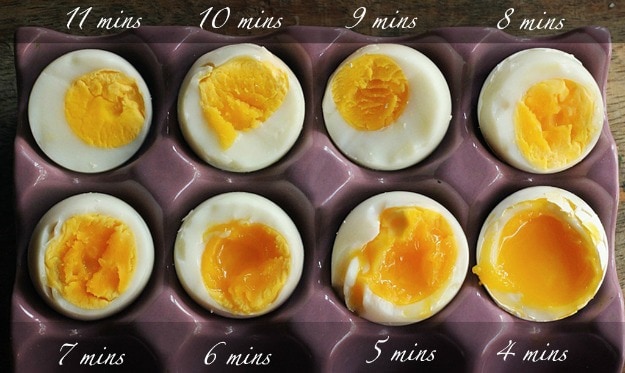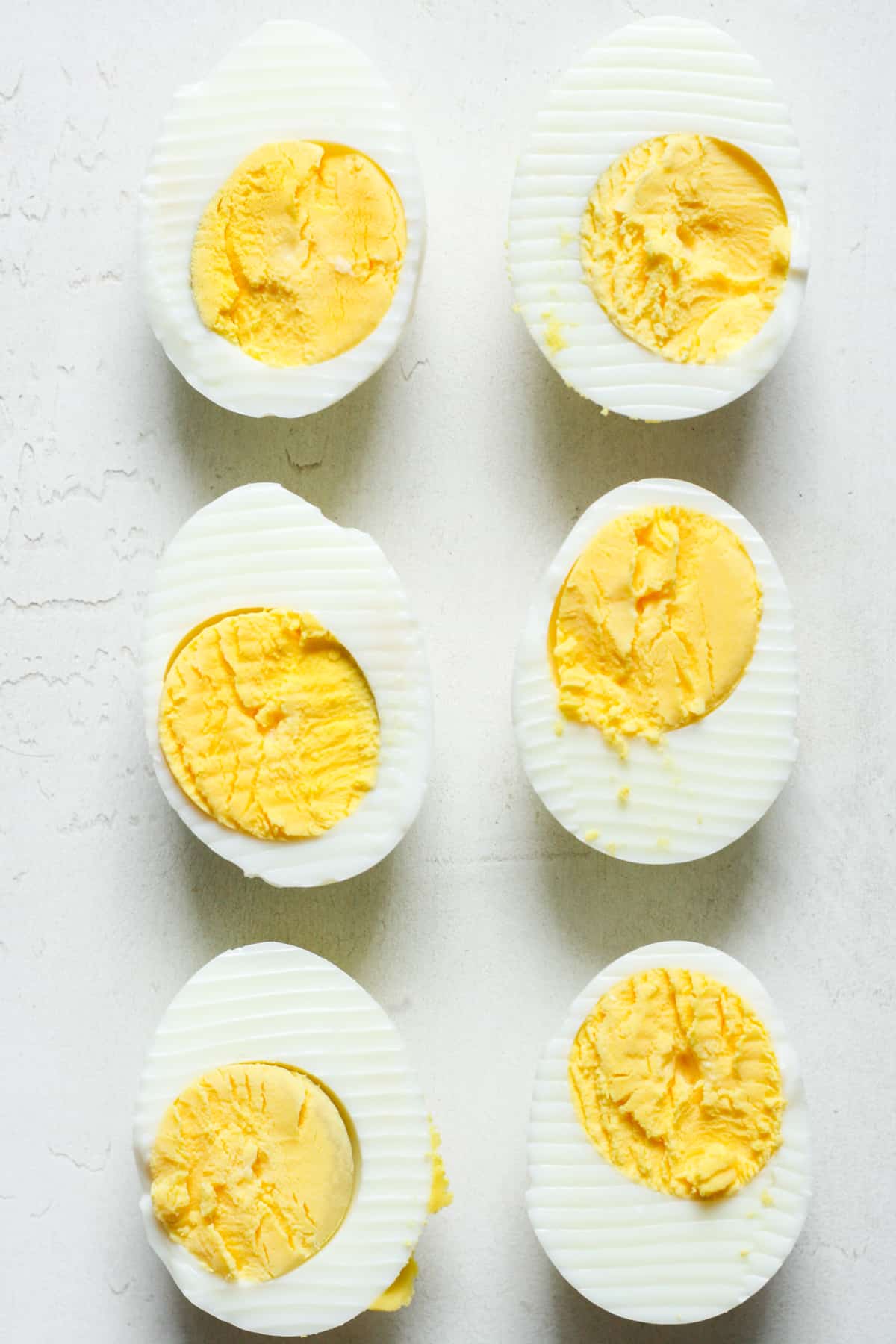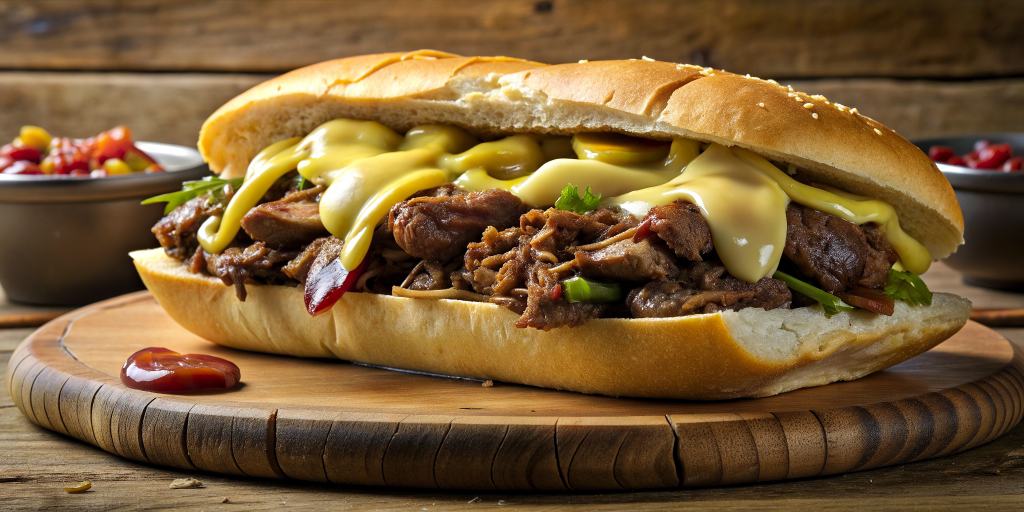To hard boil eggs in the microwave, place them in a microwave-safe bowl filled with water. Microwave on high for about 9-12 minutes, then let them sit before cooling.
Hard boiling eggs in the microwave offers a quick and convenient solution for busy schedules. This method saves time while ensuring perfectly cooked eggs without the need for a stovetop. Whether you want them for salads, snacks, or meal prep, knowing how to achieve the perfect hard-boiled egg is essential.
The microwave technique minimizes clean-up and energy use, making it an excellent choice for anyone seeking efficiency in the kitchen. Follow the simple steps outlined here to enjoy delicious, hard-boiled eggs in just minutes, satisfying both your taste buds and your time constraints.
Introduction To Microwaving Eggs
Microwaving eggs is a quick and easy method. It saves time and energy. Hard boiling eggs in a microwave can be simple. Follow the right steps to avoid mishaps. This method is perfect for busy mornings or quick snacks.
Safety First: Avoiding Explosions
Eggs can explode in the microwave. This happens due to steam buildup. To prevent this, follow these safety tips:
- Pierce the yolk: Use a fork to poke a hole.
- Use water: Place eggs in a bowl of water.
- Cover with a lid: Use a microwave-safe cover.
- Monitor cooking time: Don’t overcook the eggs.
Always be cautious. Open the microwave slowly. This prevents hot steam from escaping suddenly.
Benefits Of Using A Microwave
Microwaving eggs offers many benefits:
| Benefit | Description |
|---|---|
| Speed | Microwaving is much faster than boiling. |
| Convenience | No need for a stove or large pots. |
| Energy-efficient | Uses less energy than boiling water. |
| Easy cleanup | Fewer dishes to wash after cooking. |
This method is a great option for busy lives. Enjoy perfectly hard-boiled eggs in minutes!

Credit: thesimpleparent.com
Choosing The Right Eggs
Choosing the right eggs is essential for perfect hard-boiled eggs. Fresh eggs yield better results. Size and shell type also affect cooking times. Let’s explore these factors in detail.
Freshness Matters
Fresh eggs are key to making great hard-boiled eggs. Use the following tips to check freshness:
- Float Test: Place the egg in water. Fresh eggs sink. Older eggs float.
- Check the Date: Look for the packing date. Use eggs within 3-5 weeks.
- Sniff Test: Smell the egg. A bad egg has a strong odor.
Fresh eggs have firmer whites. They peel easily after boiling. Choose fresh eggs for the best results.
Size And Shell Considerations
Egg size impacts cooking time. Here’s a simple guide:
| Egg Size | Cooking Time (Microwave) |
|---|---|
| Small | 6-7 minutes |
| Medium | 7-8 minutes |
| Large | 8-9 minutes |
| X-Large | 9-10 minutes |
Shell thickness also matters. Thicker shells are often harder to crack. Look for eggs with smooth, unblemished shells. They cook more evenly.
Essential Tools For Microwaving Eggs
Microwaving eggs requires specific tools for best results. These tools ensure safety and efficiency. Here’s what you need to get started.
Microwave-safe Containers
Using the right container is crucial. Choose containers specifically labeled as microwave-safe. Here are some options:
- Glass Bowls: Durable and non-reactive.
- Silicone Molds: Flexible and easy to clean.
- Plastic Containers: Ensure they are BPA-free.
Always cover the container. This prevents splatter and keeps moisture inside. A microwave-safe lid or microwave-safe wrap works well.
Piercing Tools
Piercing eggs is essential for microwaving. It helps release steam and prevents explosions. Use these tools:
- Egg Piercer: Designed specifically for this purpose.
- Needle: A simple alternative. Be careful while using.
- Sharp Knife: Can create a small hole.
Always pierce the larger end of the egg. This method is effective and safe. You can enjoy perfectly hard-boiled eggs without mess!
Step-by-step Guide To Hard Boiling Eggs
Hard boiling eggs in the microwave is quick and easy. This method saves time and energy. Follow these simple steps to enjoy perfectly boiled eggs.
Preparation Steps
- Gather your ingredients: eggs, water, and a microwave-safe bowl.
- Place the eggs in the bowl. Make sure they fit without touching each other.
- Add enough water to cover the eggs completely.
- Sprinkle a pinch of salt. This helps prevent cracking.
- Cover the bowl with a microwave-safe lid or plate.
Microwave Settings And Times
| Egg Count | Time (minutes) | Power Level |
|---|---|---|
| 1-2 Eggs | 6-7 | High |
| 3-4 Eggs | 8-9 | High |
| 5-6 Eggs | 10-11 | High |
Start with the shortest time listed. Check the eggs after cooking. Adjust time as needed for desired firmness. Let the eggs sit in the microwave for a minute. This allows them to continue cooking. Carefully remove the bowl using oven mitts. The bowl will be hot. Place the eggs in cold water for a few minutes. This stops the cooking process and makes peeling easier. Enjoy your hard-boiled eggs in salads, sandwiches, or as a snack!
Troubleshooting Common Issues
Hard boiling eggs in the microwave can be tricky. Sometimes, you may face issues like uneven cooking or egg cracking. Here, we will discuss solutions to these common problems.
Uneven Cooking
Uneven cooking can lead to some eggs being overcooked while others remain undercooked. Follow these tips to ensure uniform cooking:
- Use a Microwave-Safe Dish: Choose a shallow dish for even heat distribution.
- Space the Eggs: Place eggs in a single layer. Avoid stacking them.
- Adjust Power Level: Use medium power instead of high to cook evenly.
- Turn the Eggs: Rotate the dish halfway through cooking.
Preventing Egg Cracking
Cracking eggs in the microwave is a common issue. Here are simple ways to avoid it:
- Poke a Hole: Use a needle to poke a small hole in each egg. This releases pressure.
- Cover the Eggs: Use a microwave-safe lid or plate to cover the dish. It prevents moisture loss.
- Use Water: Place eggs in a bowl of water. Water helps distribute heat evenly.
- Monitor Cooking Time: Start with short cooking intervals, like 30 seconds.
By following these tips, you can enjoy perfectly hard-boiled eggs every time!

Credit: food.ndtv.com
Post-cooking Process
Cooling Down Quickly
Cooling boiled eggs quickly helps prevent overcooking. Use these steps for effective cooling:- Fill a bowl with ice and water.
- Carefully transfer the eggs into the ice water.
- Let them sit for about 5-10 minutes.
- This stops the cooking process immediately.
Peeling Techniques
Peeling hard-boiled eggs can be tricky. Use these techniques for easier peeling:- Tap the egg gently on a hard surface.
- Roll it lightly to crack the shell.
- Start peeling from the wider end.
- Use older eggs; they peel easier.
- Peel under running water for less mess.
- Submerge in water while peeling to loosen the shell.
Creative Uses For Hard-boiled Eggs
Hard-boiled eggs are versatile and nutritious. They can enhance many meals. Here are some creative ways to use them.
Salads And Sandwiches
Hard-boiled eggs add protein to salads and sandwiches. They enhance flavor and texture. Here are some ideas:
- Egg Salad: Mix chopped eggs with mayo, mustard, and spices.
- Chef Salad: Include slices of hard-boiled eggs in your salad.
- Club Sandwich: Layer sliced eggs in a classic club sandwich.
| Dish | Main Ingredients |
|---|---|
| Egg Salad | Hard-boiled eggs, mayo, mustard, celery |
| Chef Salad | Mixed greens, hard-boiled eggs, chicken, dressing |
| Club Sandwich | Bread, turkey, bacon, hard-boiled eggs, lettuce |
Healthy Snacking
Hard-boiled eggs make great snacks. They are portable and filling. Try these simple ideas:
- On-the-Go Snack: Grab a hard-boiled egg for a quick bite.
- Egg and Avocado Toast: Top toast with sliced eggs and avocado.
- Spicy Deviled Eggs: Mix yolks with hot sauce for a kick.
These snacks are not only tasty but also healthy. Enjoy them anytime!

Credit: organicallyaddison.com
Cleaning And Maintenance
Keeping your microwave clean is essential. Proper maintenance ensures safety and efficiency. Follow these tips for easy clean-up after boiling eggs.
Microwave Clean-up
After boiling eggs, a quick clean-up is necessary. Egg spills can create a mess. Here’s how to clean your microwave effectively:
- Remove any food debris: Wipe off any egg splatters.
- Use a damp cloth: Moisten a cloth with warm water.
- Wipe surfaces: Clean the walls, ceiling, and floor.
- Use vinegar: Mix vinegar and water for tough stains.
Consider using a microwave-safe bowl with water. Heat it for five minutes. Steam helps loosen grime. After steaming, wipe with a cloth.
Storing Leftover Eggs
Storing leftover hard-boiled eggs requires care. Follow these simple steps for safe storage:
| Method | Description |
|---|---|
| In the Shell | Keep eggs in their shells. Store them in a container. |
| Peel and Store | Peel eggs and place in a covered bowl. |
Label the container with the date. Consume within one week for best quality. If eggs smell funny, discard them.
Frequently Asked Questions About How to Hard Boil Eggs in Microwave
How Long To Microwave Eggs For Hard Boiling?
To hard boil eggs in a microwave, cook them for about 6 to 8 minutes on high. The exact time may vary depending on your microwave’s wattage. Always use a microwave-safe bowl and add water to prevent them from exploding.
Let the eggs rest before peeling for best results.
Can You Hard Boil Eggs Without Water In The Microwave?
It’s not advisable to hard boil eggs without water. Cooking eggs without water may cause them to explode due to pressure buildup. Always submerge eggs in water to ensure even cooking and prevent any mess. This method is safer and yields better results.
What Type Of Container Is Best For Microwaving Eggs?
A microwave-safe bowl or dish is ideal for microwaving eggs. Glass or ceramic containers work best, as they can withstand heat. Avoid using metal or non-microwave-safe plastics, as they can cause sparks or melt. Ensure the container has enough space for water and eggs.
How Do You Prevent Eggs From Exploding In The Microwave?
To prevent eggs from exploding, always poke a small hole in each egg. This allows steam to escape during cooking. Additionally, submerge the eggs fully in water. Cover the bowl with a microwave-safe lid or plate to keep moisture in while allowing steam to vent.
Conclusion
Hard boiling eggs in the microwave is quick and easy. This method saves time and ensures perfectly cooked eggs. With the right technique, you can enjoy delicious, hassle-free hard-boiled eggs in minutes. Experiment with this method to find your ideal cooking time.
Enjoy your tasty, protein-packed snacks with minimal effort!





